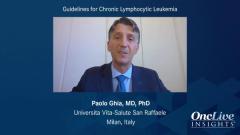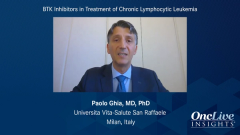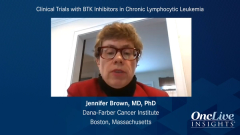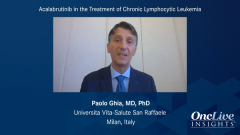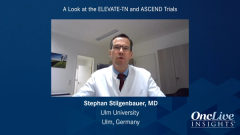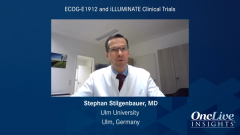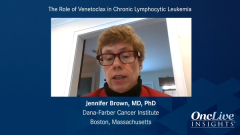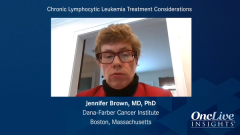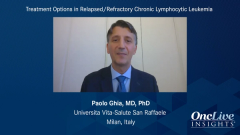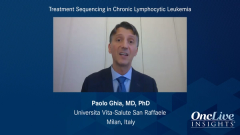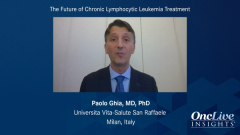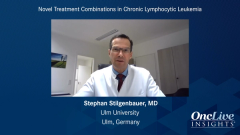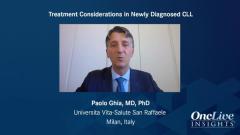
Chronic Lymphocytic Leukemia Treatment Considerations
Dr Brown and Dr Stilgenbauer provide advice for community-based oncologists treating chronic lymphocytic leukemia.
Episodes in this series

Jennifer Brown, MD, PhD: The most important thing with a patient with newly diagnosed CLL [chronic lymphocytic leukemia] or at the time of treatment is to perform the key risk stratification evaluation. This includes 17p deletion, TP53 mutation, and IGVH mutation status because these are tremendously important in choosing therapy. Patients with 17p or TP53 should never receive chemoimmunotherapy. They should get a BTK [Bruton tyrosine kinase] inhibitor, or venetoclax/obinutuzumab is also an option, but we have shorter follow-up at present. Patients with mutated IGVH are the patients who can still get chemoimmunotherapy. The data in the trials suggest they have similar at least relatively short-term PFS [progression-free survival] of 2 to 3 years compared to the control arm in the novel agent trials.
Furthermore, we have long-term follow-up with 3 studies looking at FCR [fludarabine, cyclophosphamide, and rituximab] in fit patients with mutated IGVH that suggests a 55% progression-free survival at 12 years. Some of these patients may even be cured, and that is not seen with BR [bendamustine, rituximab]. There is continuous relapse with [bendamustine, rituximab], so the young, fit, mutated patients, in my view, should get [fludarabine, cyclophosphamide, and rituximab] until or unless we have long-term follow-up that the targeted agents suggest equal benefit.
With older patients with mutated IGVH, they will still benefit from targeted therapy, but as I noted, the trials have not shown an improvement in PFS for the patient with IGVH mutation. Chemoimmunotherapy is still reasonable for them.
One needs to check the 17p, TP53, and the IGVH status before deciding that chemoimmunotherapy is reasonable because it is not reasonable for the patients with those high-risk markers or those who are older with IGVH mutations.
Stephan Stilgenbauer, MD: Today, we are obviously living in particular times, and the pandemic has changed the way we all practice medicine. We [at Ulm University in Germany] have not had much shift into telemedicine visits for our patients with CLL because CLL treatment today is largely outpatient or even at home due to the novel treatment options we have available.
Novel treatments such as acalabrutinib, ibrutinib, or venetoclax offer the opportunity of patients taking the pills at home and coming to a hospital, outpatient clinic, or office visit only rarely. Therefore, these treatment options have greatly improved our management abilities, particularly in times such as today with pandemics leading to limited access to health care, in particular in a hospital setting.
We do not usually see much increased infection rates in our patients with CLL, but obviously COVID-19 [coronavirus disease 2019] can manifest more severely in this patient population, possibly due to the age group and comorbidities that these patients have. It also could be the underlying immune deficiency that these patients with CLL have, and possibly also due to being immunocompromised from our treatment options.
Obviously, we need to accumulate more data. As you may know, there are even trials underway testing BTK inhibitor therapy to treat COVID-19 disease, but this is obviously an experimental approach that can only be justified in clinical trials, and these trials are underway.
Transcript edited for clarity.


